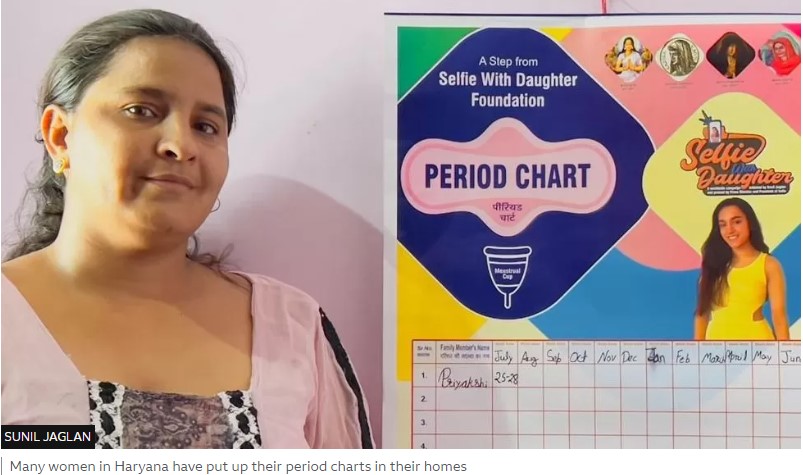Indian women fight period shame with charts on doors
August 18, 2022 12:14 PM

In India, where menstruation has long been a taboo topic, some young women have begun displaying their "period charts" on the walls or doors of their homes.
The charts, that mention the dates and duration of their periods, are not only helping them keep track of their monthly cycles - they are also helping break walls of shame that surround the topic in the country, reported BBC.
"The charts help us track whether our cycles are regular or not and if they are delayed or irregular, we can consult a doctor. This was not the case earlier," says 33-year-old Supriya Verma, who lives in Kanwari village in the northern state of Haryana.
In her village, she tells me, women in 35 homes are now putting up their menstrual charts and that it is leading to a much more open conversation on a topic that is generally discussed in hushed tones or not at all.
Also, it's making their lives easier.
"Earlier, girls and women used to keep working even when they were in pain or had uncomfortable periods as they were not able to talk to their families about it. But now families are aware when a woman is menstruating and they are more understanding," she says.
Her own family, she adds, has become more considerate of her comforts and lets her sleep until late during her periods.
"Now they know when I have my periods and need more rest. While they do not say so specifically and just say that she is not feeling well, I feel that it's a change."

Menstruating women in India still have to live under several restrictions - they are considered impure and are excluded from social and religious events, sometimes even their own kitchens. In some rural and tribal communities, women have to stay in separate menstrual huts when they get their periods.
The concept of period charts is the brainchild of Sunil Jaglan, the director of Selfie with Daughter Foundation - named after a 2015 campaign where he invited fathers to send selfies with their daughters. It found a special mention in Prime Minister Narendra Modi's radio programme "Mann ki Baat".
"We do not talk openly about periods in our homes," the 38-year-old father of two girls, told BBC. "But when my elder daughter was growing up, I felt I wanted to have an open conversation with her about this. I started speaking to doctors and gathering information. As I learnt more about the problems that women faced during periods, I started talking about it," he said.
It was from these conversations that the idea of period charts took roots around two years back.
The charts first came up in some villages in Nuh and Jind districts of Haryana.
Since then, the campaign has spread to seven Indian states with around 1,000 women participating in it.
Most of the charts, Mr Jaglan says, have been put up in the states of Haryana, Uttar Pradesh and Rajasthan - a remarkable achievement considering the three states are deeply conservative and rooted in patriarchy.
The campaign, Mr Jaglan says, has seen a fair share of resistance too.
When he shared photos of period charts on his social media, he received a lot of criticism - "about 99% of it from men".
Some girls also faced resistance from their families when they wanted to put up their charts. Among them was 21-year-old Priyanka Verma, a resident of Bhiwani district in Haryana.
"At my sister's wedding, some members of my extended family felt that since a lot of guests would be coming home, it would not be nice for them to see my period chart," she says, adding that some of her relatives even tore it down.
But she stood her ground - and put up another one and even added names of her sisters to the chart.
At the start of the campaign two years back, Mr Jaglan says he distributed 2,800 charts, but only 30% were put up in homes. But things seem to be changing for the better now and the demand for these charts has increased.
Mr Jaglan is now holding online workshops for girls to make their own charts at home. He is also organising gatherings of women where issues related to menstruation and women's health are discussed and information about sanitary napkins and menstrual cups are shared.
Anju Panghaal from Mandkola village in Haryana's Palwal district says menstruation was not a topic she could easily discuss earlier.
"This is how we've been brought up. We feel shy even while buying sanitary napkins. There are myths attached to periods, women are not allowed to touch pickles or visit temples. It is difficult to make people understand that the pickle does not get spoilt if a menstruating woman touches it or the temple does not become impure," she adds.
Anju says that when she decided to put up a period chart at home in Mandkola, some family members were not welcoming of the idea. However, they came around to accepting it.
It may take time for mindsets to change and conversations around periods to be more open. But the persistence of Mr Jaglan and these young women has started to make a difference.






 Public Holiday announced in Lahore tomorrow
Public Holiday announced in Lahore tomorrow Police claim girl seen in sub-inspector’s video was his second wife
Police claim girl seen in sub-inspector’s video was his second wife Nazish Jahangir to hit any marriage proposal from Babar Azam out of the ground
Nazish Jahangir to hit any marriage proposal from Babar Azam out of the ground Complete results: PML-N sweeps by-elections as PTI-SIC remains empty-handed in Punjab
Complete results: PML-N sweeps by-elections as PTI-SIC remains empty-handed in Punjab Iranian First Lady visits Numl
Iranian First Lady visits Numl Man shoots friend dead in DHA Karachi over personal grudge
Man shoots friend dead in DHA Karachi over personal grudge





